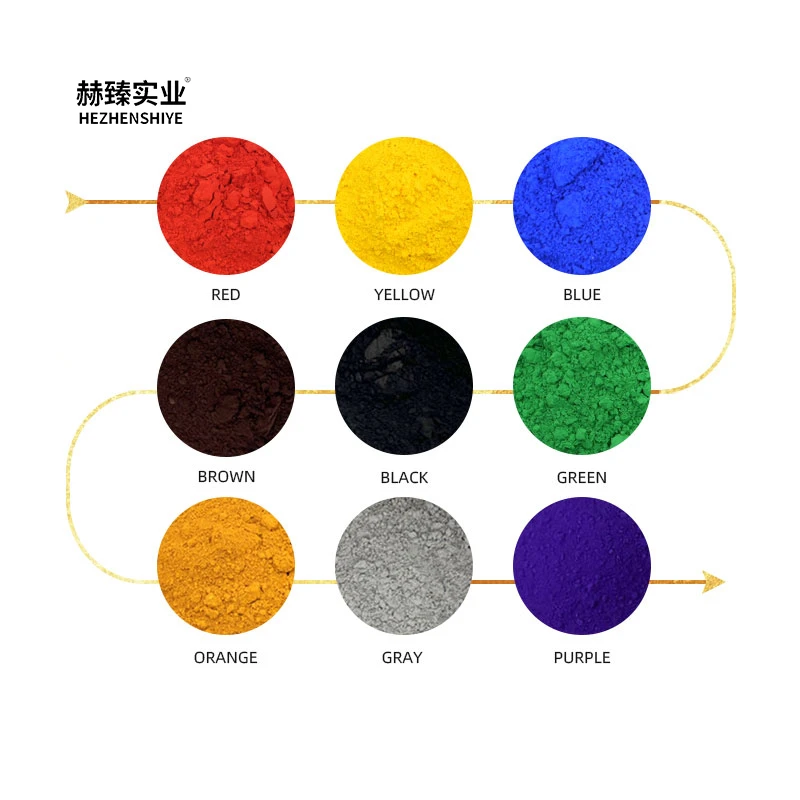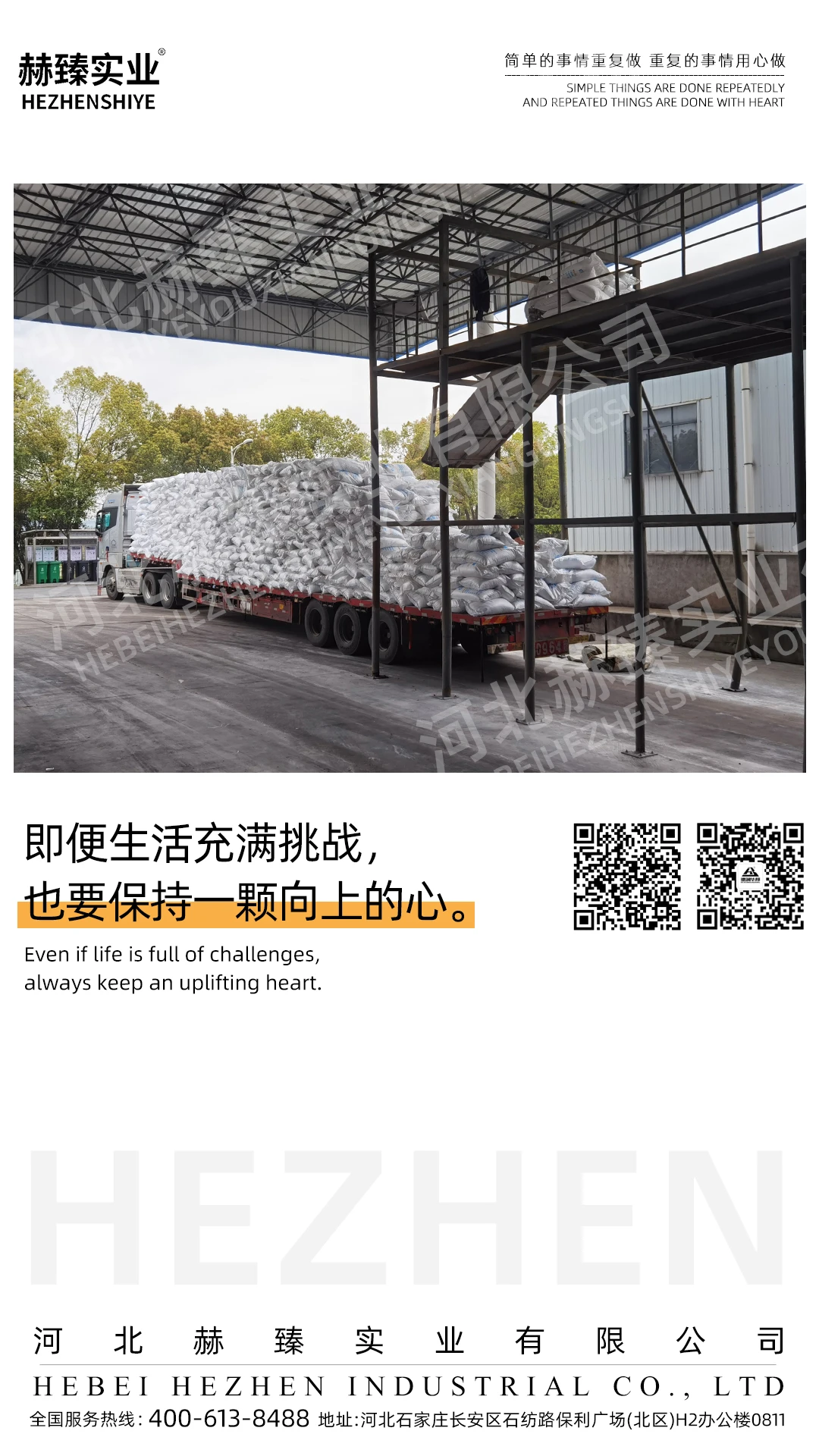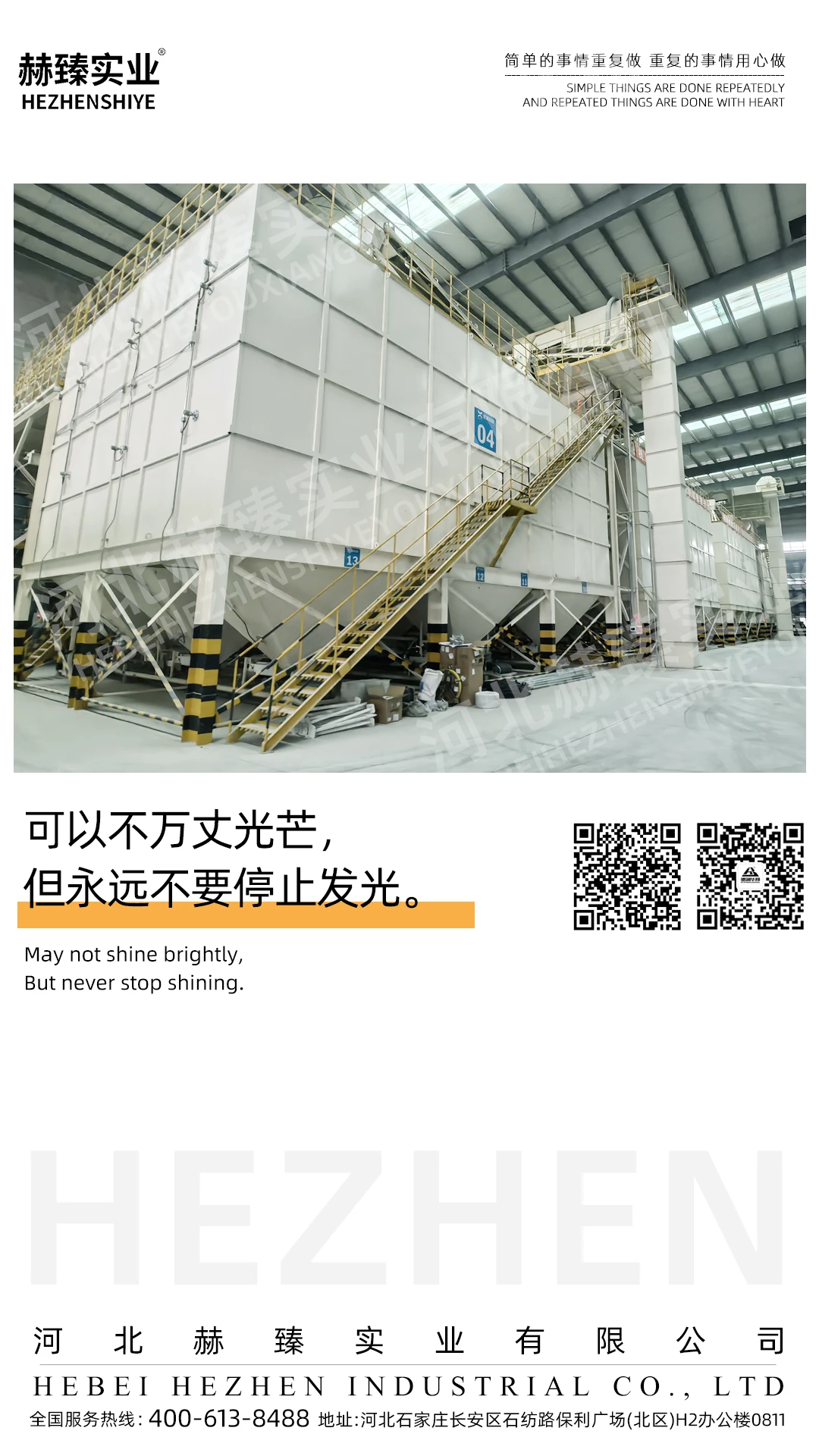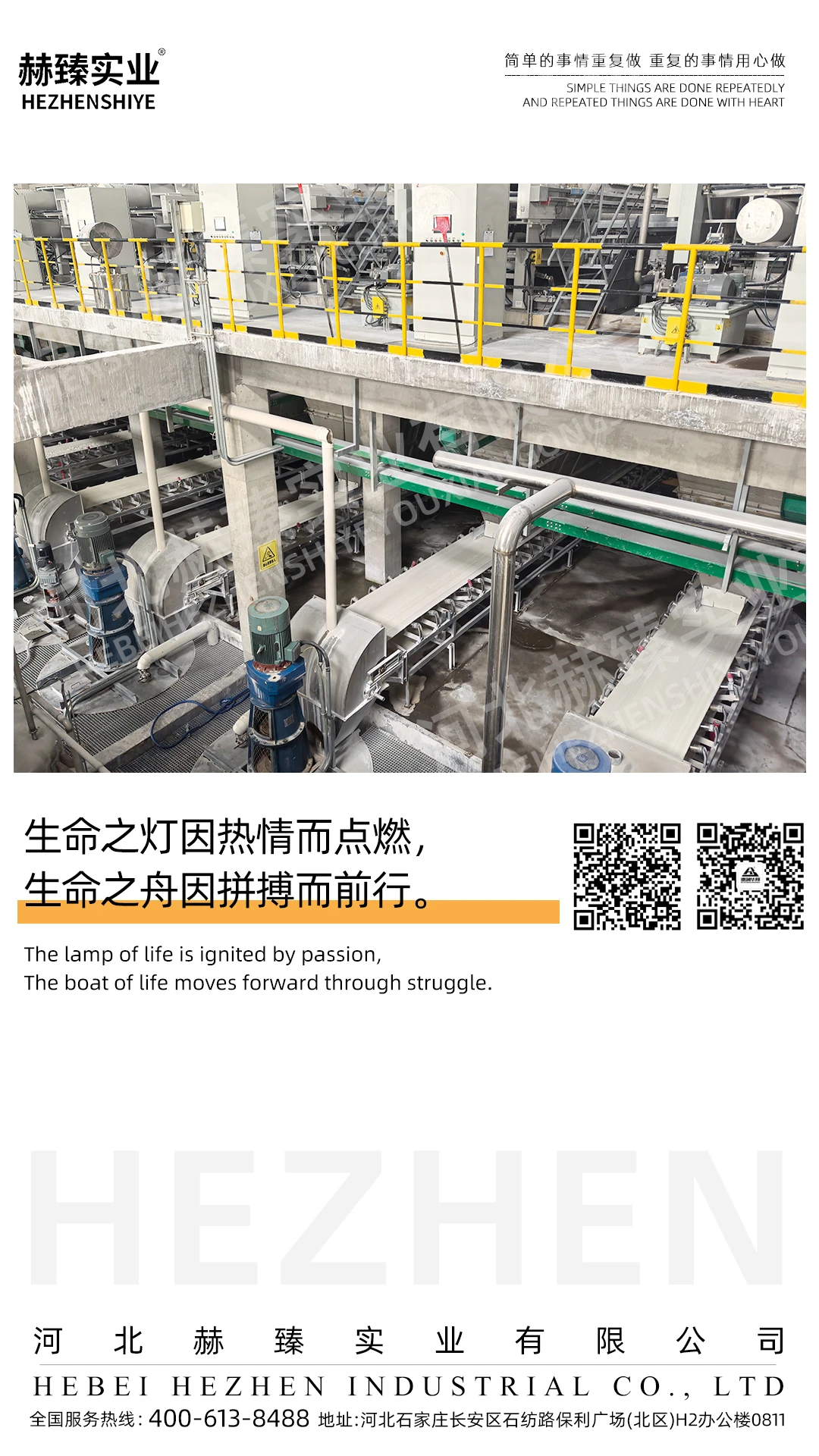Hebei Hezhen Industrial Co., Ltd. Promotes Industrial Progress With Persistence And Courage To Gain Global Attention
2025.11.17
Hebei Hezhen Industrial Co., Ltd. is industrial enterprise that follows strict operational philosophy. This philosophy is not just set of words on company walls but living principle that guides every action, every decision and every interaction within organization. At core of this philosophy lies belief that simple things are done repeatedly and repeated things are done with heart. This idea may seem straightforward, but its implementation requires unwavering commitment from every member of team, from newly hired entry-level staff to senior management. To understand how this philosophy takes shape in daily operations, one must look beyond surface-level descriptions and dive into intricate details of company’s day-to-day work. Take, for example, most basic task of material handling in warehouse—action that is repeated hundreds of times each day. Instead of treating it as mindless chore, employees at Hebei Hezhen Industrial approach it with meticulous attention to detail. When raw materials arrive at warehouse gate, they are not just unloaded and stacked randomly. First, receiving team verifies type and condition of materials, comparing them with order specifications to ensure no discrepancies. Each package is inspected for damage, and any issues—whether small tear in packaging or slight deformation of materials—are documented immediately with photos and written records, then reported to purchasing team to prevent subpar materials from entering production process. This step may seem simple, but it is repeated without fail for every delivery, no matter how large or small. Even during peak seasons when dozens of delivery trucks line up outside warehouse, receiving team maintains same pace of careful inspection, refusing to compromise on standards. Once materials are cleared for entry, they are sorted according to strict categorization system that has been refined over years based on practical experience. This system is designed to make retrieval efficient, but it also reflects company’s commitment to doing repeated things with care. Each shelf in warehouse is labeled with both physical tags and digital codes that can be scanned with handheld devices, and materials are placed in designated areas based on their type, usage frequency and storage requirements—for instance, fast-moving materials are stored near warehouse exits for quick access, while rarely used items are placed in upper shelves to save prime space. Employees who handle this sorting process have undergone rigorous training that includes both classroom lectures on material characteristics and on-the-job practice under supervision of senior staff, ensuring they can identify each material correctly and place it in right location. Even when workload is heavy—such as when new batch of materials arrives right before shift change—they never rush through process, knowing that single mistake in sorting could lead to hours of searching later or even production delays that affect client deadlines. Beyond sorting and storage, regular inventory checks are another example of company’s operational philosophy in action. These checks are not occasional tasks but scheduled events that happen at fixed intervals—weekly spot checks for high-frequency materials and monthly full inventory checks for all items. During these checks, teams of two employees work together, one counting and verifying items while other records data in company’s digital management system. This dual-check system minimizes human error and ensures accuracy. This process is time-consuming and repetitive, especially for large batches of small parts that need to be counted one by one, but it is essential to maintaining accurate inventory levels and preventing stockouts or overstocking. What sets Hebei Hezhen Industrial apart is that employees approach these checks with same level of care each time. They do not cut corners—such as estimating counts instead of counting individually—or skip steps, even when they have done same check dozens of times before. One senior warehouse staff member once said in internal interview that repeating careful checks is like building wall brick by brick; each accurate count is brick that supports company’s reliability. Management team plays crucial role in upholding this philosophy. Instead of just issuing orders from offices, managers lead by example. They often join employees in warehouse operations during busy periods, participating in sorting, inventory checks and even material unloading to show that no job is too small and that attention to detail matters at every level. During monthly inventory checks, general manager can often be seen wearing work clothes, kneeling on floor to count small components stored in lower shelves. They also hold regular “philosophy sharing meetings” every Friday afternoon, where employees from different departments share stories about how they applied company’s operational principles in their work. These meetings are not just for reporting but for mutual learning—for example, warehouse team once shared tip about using color-coded labels to speed up sorting, which was later adopted by purchasing team to improve order verification efficiency. This collaborative approach ensures that operational philosophy is not just top-down mandate but shared value that everyone believes in. The spacious warehouse itself is designed to support this orderly approach to operations, with design process involving input from warehouse staff who have on-the-ground experience. Unlike cluttered or disorganized facilities that can hinder efficiency, Hebei Hezhen Industrial’s warehouse has logical layout with wide aisles—wide enough to accommodate two material handling carts passing each other without difficulty—that allow for easy movement of materials. Areas for receiving, sorting, storage and shipping are clearly separated by low partition walls and color-coded floor markings, reducing chance of confusion. Lighting is bright throughout facility with energy-saving LED lights installed above each shelf, ensuring that employees can see details clearly when inspecting materials or reading labels, even during early morning or late evening shifts. Even small design elements reflect company’s consideration for both efficiency and employee well-being: shelves are placed at height between waist and shoulder for most employees, reducing need to bend over or reach up excessively; anti-fatigue mats are laid in areas where employees stand for long periods, such as receiving desks; and water dispensers and rest areas are scattered throughout warehouse to ensure staff can take short breaks without walking long distances. All these efforts in warehouse management and operational discipline come together to ensure that industrial operations run smoothly. When materials are stored correctly and labeled clearly, production teams can retrieve what they need in matter of minutes instead of hours, reducing downtime significantly. When inventory levels are accurate, purchasing teams can order materials in timely manner—neither too early to avoid unnecessary storage costs nor too late to cause production halts. When every employee takes pride in doing simple tasks well, quality of work across entire organization improves: production teams receive high-quality materials, sales teams can promise delivery times with confidence, and client satisfaction rates remain consistently high. This smooth operation is not just benefit for company itself but also foundation for providing reliable services to its clients, laying groundwork for long-term business relationships.
The team of Hebei Hezhen Industrial is heart and soul of company’s success, and it is this team that embodies courage and willingness to overcome hardships that defines organization. Unlike teams that crumble under pressure or shy away from challenges, employees at Hebei Hezhen Industrial approach difficulties as opportunities to grow and improve. This spirit is not something that is just talked about in company meetings—it is demonstrated in day-to-day work and in way team responds to unexpected obstacles, big and small. To understand true nature of this team, one must look at its composition and how it is built. Hebei Hezhen Industrial does not just hire employees based on technical skills alone; it places great emphasis on finding individuals who share company’s values of diligence, courage and attention to detail. During recruitment process, candidates go through multi-round interviews that include not just skill assessments but also behavioral interviews. For example, candidates are asked to describe specific situations where they faced heavy workloads or difficult problems, how they handled them, and what they learned from experience. One key question often asked is: “How would you ensure quality when repeating same task hundreds of times?” Responses to such questions help hiring team identify candidates who have right mindset. This careful selection process ensures that new hires are not just capable of doing job but also fit into company’s culture of resilience and teamwork. Once hired, employees go through comprehensive training program that lasts for one month, going beyond teaching job-specific skills. First week is dedicated to company culture and values: new employees learn about company’s history—from its humble beginnings as small workshop to its current scale—as well as its core philosophy through lectures, video materials and talks with senior employees. Second to fourth weeks focus on practical skills training, where new hires are paired with experienced mentors who have worked at company for at least three years. Mentors do not just show new employees how to complete tasks—they also model company’s values, demonstrating how to approach repeated work with care (such as double-checking every label during sorting) and how to stay calm when faced with challenges (such as dealing with wrong material deliveries). Mentors and mentees meet every day after work to review progress and address questions, and mentees are evaluated not just on task completion but also on adherence to company principles. This training and mentorship program helps build strong foundation for team unity and ensures that every employee understands their role in company’s success. The team is organized into departments that work closely together, breaking down silos that can hinder progress in many industrial enterprises. Company has established “cross-departmental collaboration teams” for key projects, bringing together members from production, sales, customer service and logistics to ensure seamless communication. For example, when taking on large order from new client, collaboration team holds kickoff meeting where sales team shares detailed client requirements (such as delivery schedules and quality standards), production team outlines production plans and timeline, logistics team discusses transportation options, and customer service team proposes follow-up plans. During project execution, weekly meetings are held to update progress and address any issues—if production team encounters delay due to equipment maintenance, they immediately inform sales and customer service teams, who then communicate with client proactively to adjust expectations. This collaboration ensures that there are no misunderstandings or miscommunications that could lead to client dissatisfaction. Similarly, customer service department works as “bridge” between clients and internal teams. If client has question or concern—such as inquiry about order status or request for minor adjustment to service—customer service team does not just pass it along; they first gather all relevant information (such as order number, previous communications) and then work with relevant departments to find solution. For example, if client needs to advance delivery date, customer service team coordinates with production team to see if production can be accelerated and with logistics team to book earlier transportation, then provides client with clear new timeline. One of most striking examples of team’s courage and resilience occurred during summer two years ago, when company faced sudden surge in orders from three key clients at same time. This surge was unexpected—orders totaled 150% of company’s usual monthly production capacity—and it threatened to overwhelm company’s usual operations. Many companies in similar situation might have turned down some orders or rushed through production, sacrificing quality to meet deadlines. But at Hebei Hezhen Industrial, team responded differently. First, management called emergency meeting with all department heads within two hours of receiving final order confirmation. Instead of making decisions unilaterally, they asked for input from each team, asking how they thought company could rise to challenge. Production team suggested adjusting work schedules to include morning and evening extra shifts, with employees volunteering to work additional hours—many even offered to give up weekend rest. Sales team offered to communicate with clients to set realistic expectations, explaining that company was committed to quality and would deliver orders as soon as possible without cutting corners, and proposed prioritizing orders based on client urgency. Customer service team offered to provide daily updates to clients, sending photos of production progress and inventory status to keep them informed. What followed was remarkable display of teamwork that lasted for four weeks. Employees from different departments volunteered to help where they could: office staff who usually handled administrative work helped with packing finished products and labeling packages; maintenance team worked overtime to ensure all production equipment was in good condition, conducting daily inspections instead of weekly ones; even human resources team joined in, preparing meals and snacks for employees working night shifts and arranging transportation for those who worked late. Senior managers took turns working night shifts to supervise operations and provide support. Throughout this period, there was no complaining or resentment; instead, there was sense of shared purpose. Employees would encourage each other during breaks, and team leaders organized brief daily pep talks to acknowledge hard work. When orders were finally delivered on time and to high standard—with zero quality complaints from clients—company held celebration where each employee received certificate of appreciation and bonus. Many clients were impressed by company’s ability to handle pressure, and all three became long-term partners, often recommending Hebei Hezhen Industrial to other businesses in their networks. This incident is not isolated case—it is reflection of how team operates every day. Whether it is dealing with delayed shipments from suppliers (team will quickly find alternative suppliers and renegotiate delivery times), adjusting to last-minute changes in client requirements (collaboration teams revise plans within hours) or finding ways to improve efficiency (employees brainstorm ideas during lunch breaks), team approaches every challenge with same courage and collaboration. Another key strength of team is its focus on continuous improvement, which is embedded in company culture. Employees are encouraged to share ideas for how to make work processes better, even if those ideas involve changing way things have always been done. Company has established “idea bank” system: employees can submit improvement proposals online at any time, and special committee reviews each proposal monthly. Proposals that are adopted receive rewards—ranging from cash bonuses to extra days off—and proposers are recognized in company-wide meetings. Many of these ideas have been implemented to great effect. For example, one production worker noticed that time was wasted when employees had to walk back and forth to get tools, so he proposed placing tool carts near each production line; this small change reduced tool retrieval time by 30% per shift. Another employee in customer service suggested creating database of common client questions and answers, categorized by industry and service type; this reduced average response time to client inquiries from 24 hours to four hours and improved consistency of information provided. This focus on improvement is driven by team’s desire to not just meet standards but exceed them. They understand that in competitive industrial sector, standing still means falling behind, so they are always looking for ways to do better—whether through small process tweaks or major workflow overhauls. When it comes to providing professional services and meeting diverse client needs, team’s collaborative and client-centric approach shines through. Hebei Hezhen Industrial serves wide range of clients, from small local businesses that need small-batch, frequent deliveries to large multinational corporations that require large-scale, long-term service contracts, each with unique requirements and expectations. Instead of offering one-size-fits-all solutions, team takes time to understand each client’s specific needs, goals and challenges. This process begins with in-depth initial consultation, where sales and customer service teams meet with client—either in person or via video call—to ask detailed questions and listen carefully to their needs. They do not just talk about company’s services; they ask about client’s industry characteristics, their current operational pain points (such as frequent inventory shortages or inefficient material usage), their long-term development goals (such as expanding to new regions) and even their previous negative service experiences. This thorough understanding allows team to develop customized solutions that address client’s specific needs. For example, one client—a medium-sized manufacturing company—was struggling with inefficiency in their own supply chain, often facing delays because materials arrived either too early (taking up warehouse space) or too late (halting production). They turned to Hebei Hezhen Industrial for help with material sourcing and delivery. Instead of just providing standard delivery service, team worked with client for two weeks to analyze their production cycles, inventory levels and order patterns. They then proposed “just-in-time delivery plan” tailored to client’s production schedule: materials would be delivered three days before they were needed, in batches that matched client’s daily production volume. Team also offered to set up dedicated account manager to coordinate with client’s production department, ensuring any changes in production schedule were communicated immediately. This customized approach not only solved client’s immediate problem of supply chain inefficiency but also helped them reduce inventory costs by 25% within six months. After delivering service, team does not just move on to next client—they maintain ongoing relationship with clients to ensure long-term satisfaction. They conduct quarterly satisfaction surveys, either via phone or face-to-face meetings, to ask about service quality, identify any areas for improvement and learn about new client needs. For long-term clients, account managers arrange annual business reviews where they present service performance reports (such as on-time delivery rates, quality compliance rates) and discuss future service plans aligned with client’s development goals. Many clients have commented that what sets Hebei Hezhen Industrial apart from other industrial service providers is its willingness to go extra mile. Whether it is staying late to process urgent order that client needs for unexpected production rush, adjusting delivery routes to avoid traffic jams and ensure on-time arrival, or providing free training for client’s staff on how to use materials more efficiently, team is always ready to help. This commitment to client success is not just part of company’s service policy—it is part of its culture, fostered by team’s dedication and empathy. Employees often say that client’s success is company’s success, and this mindset drives them to provide best possible service every day.
By adhering to its core values and working diligently, Hebei Hezhen Industrial is not just striving to become respected enterprise in industrial sector—it is actively building reputation as reliable, ethical and innovative leader that makes positive contributions to industrial development around world. Core values of company—integrity, diligence, collaboration and continuous improvement—are not just buzzwords; they are guiding principles that shape every aspect of company’s operations, from its relationships with suppliers to its role in broader industry community. Integrity is foundation of all company’s interactions, both internal and external. When dealing with suppliers, Hebei Hezhen Industrial prides itself on fair and transparent practices. It negotiates contracts that are beneficial to both parties, pays invoices on time and communicates openly about any issues that may arise. This commitment to integrity has helped company build strong, long-term relationships with network of suppliers who trust it to act honestly and responsibly. Suppliers know that when they work with Hebei Hezhen Industrial, they will not be subjected to unfair demands or hidden fees, and this trust translates into more reliable supply chain. For example, during period when raw material prices were rising sharply, many industrial enterprises tried to pressure suppliers into keeping prices low or delaying price increases. Hebei Hezhen Industrial, however, chose to have open conversation with its suppliers. It acknowledged challenges suppliers were facing and worked with them to find mutually beneficial solution, such as adjusting order quantities to help suppliers manage their own costs. This approach not only maintained supply chain stability but also strengthened trust between company and its suppliers. Internally, integrity means being honest with colleagues and taking responsibility for mistakes. Employees are encouraged to admit when they make error rather than hiding it, knowing that company values accountability over blame. Management team leads by example in this regard, openly acknowledging their own mistakes and working with team to correct them. This culture of integrity fosters trust among employees, which in turn strengthens teamwork and collaboration. Diligence, another core value, is evident in way every employee approaches their work. It is not just about working hard—it is about working smart and being committed to excellence. Employees at Hebei Hezhen Industrial do not just complete tasks to minimum standard; they strive to do their best every day, even when working on most repetitive or mundane tasks. This diligence is reflected in quality of company’s services, which consistently meet or exceed client expectations. It is also reflected in company’s ability to adapt to changing market conditions. When new technologies or industry trends emerge, company does not resist change—it invests in training for employees to ensure they have skills needed to stay ahead. For example, when digital tools for inventory management became more prevalent in industrial sector, company provided training for warehouse staff to learn how to use these tools effectively. Instead of seeing new technology as threat, team embraced it as way to improve efficiency and accuracy, demonstrating diligence in keeping up with industry developments. Collaboration, both within company and with external partners, is key to Hebei Hezhen Industrial’s success. Internally, as discussed earlier, departments work closely together to ensure smooth operations and client satisfaction. Externally, company actively seeks out partnerships with other industrial enterprises, industry associations and educational institutions to drive innovation and industry development. It participates in industry conferences and workshops, where it shares its experiences and learns from other leaders in field. It also partners with local colleges and universities to provide internships and training programs for students interested in industrial careers. These partnerships not only help company attract talented young professionals but also contribute to development of skilled workforce for entire industry. One notable example of external collaboration is company’s participation in industry working group focused on promoting sustainable practices in industrial sector. While company does not deal with environmentally sensitive industries like manufacturing of chemicals or heavy machinery, it recognizes importance of sustainability for long-term health of industry and planet. Working with other enterprises in group, Hebei Hezhen Industrial has helped develop guidelines for reducing waste in warehouse operations, improving energy efficiency in facilities and promoting responsible sourcing of materials. These guidelines have not only benefited company’s own operations—reducing its environmental footprint and operating costs—but have also been adopted by other enterprises in sector, demonstrating company’s commitment to contributing to broader industry good. Continuous improvement is value that drives Hebei Hezhen Industrial to never be satisfied with status quo. Company has formal process for collecting feedback from employees, clients and suppliers, and it uses this feedback to identify areas for improvement. Every quarter, management team reviews this feedback and develops action plans to address any issues or implement suggested changes. This commitment to improvement has led to numerous enhancements in company’s operations over years. For example, based on client feedback about delivery times, company reorganized its shipping department and adjusted delivery routes to reduce transit times by average of 15 percent. Based on employee feedback about workload during peak periods, company implemented more flexible scheduling system that allowed for better work-life balance while still meeting client demands. These changes not only improved efficiency and client satisfaction but also boosted employee morale, creating positive cycle of continuous improvement. As Hebei Hezhen Industrial strives to become respected enterprise in industrial sector, it has clear vision for future. In short term, company aims to expand its client base beyond domestic market to include more international clients. It recognizes that global industrial sector is interconnected, and it wants to bring its values and services to businesses around world. To achieve this goal, company is investing in language training for its sales and customer service teams, as well as researching different international markets to understand their unique needs and regulations. It is also exploring partnerships with local distributors in key international regions to help it establish presence in those markets. In medium term, company plans to expand range of services it offers to clients. While it currently focuses on material management and related industrial services, it aims to add services like supply chainBy adhering to its core values of diligence, attention to detail and client-centricity, and working diligently day in and day out, Hebei Hezhen Industrial is steadily moving toward its goal of becoming respected enterprise in industrial sector and making positive contributions to industrial development around the world. This ambition is not empty slogan but clear roadmap that guides company’s long-term development, with specific strategies and actions in place to achieve it. One key aspect of company’s development plan is expanding its service scope and geographical reach. While currently serving clients mainly in domestic market, Hebei Hezhen Industrial has started exploring international opportunities in recent years. It has established partnership with two local service providers in Southeast Asia to learn about regional industrial standards, market demands and logistics networks. Company has also hired team of multilingual staff who are proficient in English, Thai and Vietnamese to communicate with potential international clients. In addition, it has revised its service processes to comply with international quality management systems, ensuring that its services meet standards required by global clients. For example, it has introduced more stringent quality inspection procedures and detailed service documentation that meets international certification requirements. These efforts have already borne fruit: last year, company secured its first international order from Thai manufacturing client, who was impressed by company’s detailed service plan and commitment to quality. This order not only opened door to Southeast Asian market but also boosted team’s confidence in going global. Another focus area for company is technological innovation to enhance operational efficiency and service quality. While Hebei Hezhen Industrial values traditional principles of careful work, it also recognizes importance of embracing new technologies to stay competitive. Company has invested in upgrading its digital management system, introducing advanced inventory management software that uses barcode scanning and real-time data synchronization to further improve inventory accuracy and reduce manual errors. This software allows all departments to access real-time inventory data, enabling better coordination—for example, sales team can check inventory levels instantly when negotiating with clients, and production team can adjust plans based on real-time material availability. Company is also exploring use of automated material handling equipment in warehouse, such as small automated guided vehicles (AGVs) for transporting materials between shelves and shipping areas. These AGVs can work 24 hours a day without fatigue, reducing physical workload on employees and improving transportation efficiency. During trial period, AGVs reduced material transportation time by 40% in designated warehouse areas, showing great potential for wider application. Beyond technological upgrades, company is committed to contributing to sustainable industrial development. It recognizes that modern industrial enterprises have responsibility to minimize environmental impact and promote green operations. To this end, Hebei Hezhen Industrial has taken series of measures: it has replaced all traditional lighting in warehouse and production areas with energy-saving LED lights, reducing electricity consumption by 30% annually; it has implemented waste sorting and recycling system in all facilities, separating recyclable materials such as packaging cartons and metal scraps from general waste, with recycling rate reaching 60% last year; it has also optimized delivery routes to reduce fuel consumption and carbon emissions, working with logistics partners to combine shipments to same region whenever possible. Company is also researching use of more environmentally friendly packaging materials for products and materials, aiming to reduce use of plastic packaging by 50% within next three years. These green initiatives not only help protect environment but also enhance company’s reputation among clients who value sustainability, opening up new business opportunities with environmentally conscious enterprises. Investing in employee development is another key strategy for company’s long-term success. Hebei Hezhen Industrial believes that growing employees means growing company, so it has established comprehensive employee development system.











